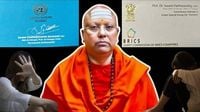Delhi Police have arrested self-styled spiritual leader Chaitanyananda Saraswati, also known as Partha Sarathy, following a dramatic early morning raid at a hotel in Agra on Sunday, September 28, 2025. The 62-year-old’s capture marks the latest chapter in a sprawling investigation that has exposed a tangled web of alleged sexual harassment, financial fraud, and identity deception. The scope of the case has left many in India’s academic and spiritual circles reeling, while authorities continue to peel back layers of Saraswati’s elaborate public persona.
According to reports by ANI and Hindustan Times, Saraswati was apprehended by a Delhi Police team that tracked him to Agra’s Taj Ganj area, ending nearly 50 days on the run. He had fled Delhi on August 4, the very day an FIR was registered against him at Vasant Kunj North Police Station. The complaint, lodged by an administrator at the Sri Sharda Institute of Indian Management in South Delhi, accused Saraswati of serious sexual misconduct involving female students. The institute, affiliated with Sri Sharada Peetham in Sringeri, offers a Postgraduate Diploma in Management under the Economically Weaker Sections scholarship scheme—a program now overshadowed by scandal.
The case against Saraswati is anchored in the statements of 32 female students, 17 of whom directly accused him of using abusive language, sending obscene messages via WhatsApp and SMS, and making unwanted physical contact. Investigators also heard disturbing accounts of Saraswati allegedly forcing female students to visit his quarters late at night and sending inappropriate messages at odd hours. One officer told Hindustan Times that Saraswati “kept track of the students’ movements through his phone,” heightening fears of surveillance and intimidation within the campus community.
Compounding the trauma, the FIR details allegations that certain women faculty and administrators at the institute pressured victims into complying with Saraswati’s demands. These revelations have triggered broader questions about institutional accountability and the role of enablers in perpetuating abuse. After weeks of mounting evidence, a formal case under sexual harassment laws was registered on September 23, 2025, setting the stage for the nationwide manhunt that led to Saraswati’s arrest.
The drama did not end with his capture. During the arrest, police seized two counterfeit visiting cards from Saraswati—one identifying him as a “Permanent Ambassador to the United Nations,” the other as a “Special Envoy of India” and a member of the BRICS Joint Commission. Authorities were quick to clarify that both identity cards were entirely fabricated, designed to project global influence and diplomatic stature. “These ID cards were completely fake and were created to falsely project global influence and diplomatic status,” a senior Delhi Police officer told Republic World. The fake credentials, police believe, helped Saraswati build trust and avoid scrutiny, especially in elite academic and religious circles where such titles command instant respect.
The arrest has also shone a spotlight on Saraswati’s alleged financial crimes. According to ANI, investigators discovered that Saraswati operated multiple bank accounts under different names. After the FIR was filed in August, he allegedly withdrew over ₹50 lakh—an apparent attempt to move and conceal funds before law enforcement could intervene. Police had already frozen around ₹8 crore stashed across various accounts and fixed deposits linked to Saraswati. An officer from the Economic Offences Wing told Republic World, “It appears he tried to move and hide large sums of money as soon as he learned about the complaints. This shows clear intent to obstruct the investigation.”
As the financial probe deepened, police began to question the veracity of Saraswati’s academic and professional claims. His published profiles boast an MBA and PhD from the University of Chicago Booth School of Business, 28 authored books, and 143 research papers. Some of his works allegedly include praise from global luminaries such as Steve Jobs and Ban Ki-Moon, and even claim that former US President Barack Obama referenced one of his titles, Transforming Personality, during his 2007 election campaign. But as a senior officer told Republic World, “These claims are currently being verified. At this point, we suspect they are exaggerated, if not entirely false.” The investigation has now expanded to include a forensic review of Saraswati’s academic qualifications, publications, and public statements.
Meanwhile, the Sri Sharada Peetham, an influential religious institution with which Saraswati had long been affiliated, has moved to distance itself from the embattled godman. The Peetham revoked the Power of Attorney it had issued to Saraswati in 2008, signaling a decisive break and underscoring the reputational risks posed by the scandal. This development has left many followers and students questioning how such an individual could rise to prominence within respected religious and educational frameworks.
Authorities have not ruled out the possibility of more victims or additional financial fraud cases emerging as the investigation unfolds. Police are now focused on verifying Saraswati’s qualifications, tracing the origins of the frozen funds, and identifying any accomplices who may have aided him while he was absconding. The case has also prompted renewed scrutiny of how spiritual leaders use institutional affiliations and fabricated credentials to build personas that can mask predatory behavior.
For many in India, the saga of Chaitanyananda Saraswati serves as a cautionary tale about the dangers of unchecked authority and the vulnerability of institutions to manipulation by charismatic figures. The case has also reignited debates about the need for stronger safeguards and oversight in both spiritual and academic settings—especially when it comes to protecting students and vulnerable individuals from abuse.
As the legal process moves forward, the coming weeks are likely to bring more revelations about the scale and sophistication of Saraswati’s alleged deception. For now, Delhi Police remain tight-lipped about what they might uncover next, but they have assured the public that no stone will be left unturned. The fallout from this case, both for Saraswati’s former followers and the wider community, is only just beginning to be felt.
With the investigation still very much active, all eyes are on the authorities as they work to untangle the full extent of Chaitanyananda Saraswati’s influence—and the legacy of harm left in his wake.




